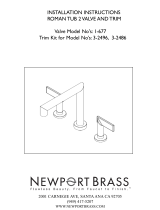General Characteristics
In case of instantaneous heaters, hot water flow has to at least meet flow required by heater
and maintain burning. (Specified by heater manufacturer)
Operating Specifications
Hot water supply temperature:
Maximum: 185°F (85°C).
Note 1: Maximum temperature through this valve is limited by that of the hot water supply
(up to a maximum of 120°F when accurately calibrated).
Note 2: Minimum difference between hot and mixed temperature is 18°F (10°C).
Cold water supply temperature:
Minimum: 41°F (5°C)
Operating Pressure:
Maximum: 80 PSI
Minimum: 20 PSI
Operating pressure (on hot and cold line) should be kept as balanced as possible in order to
assure maximum efficiency.
When the pressure is greater than 80 PSI, a pressure reducer is required to be fitted
before valve.
Technical Data
The temperature control knob is graduated from 75°F to 120°F with auto stop at 100° to
avoid scalding.
Plumbing Recommendations
• An independent water supply for both hot and cold is required. Do not pipe off ring main.
• Large runs of pipe work will cause frictional loss of pressure.
• The recommended main water supply piping to valve shall be 1/2” minimum
• If more than one valve is installed, the recommended main water supply piping to valve shall
be 3/4” minimum, reducing to 1/2” within 24” of each valve.
(Ensure adequate supply from both hot and cold water can be maintained.)
Water By-Laws
The mixing valve should be installed in compliance with the water by-laws. For further details
refer to the latest copy of by-laws guide or your local water authority.
NWP-1-742












